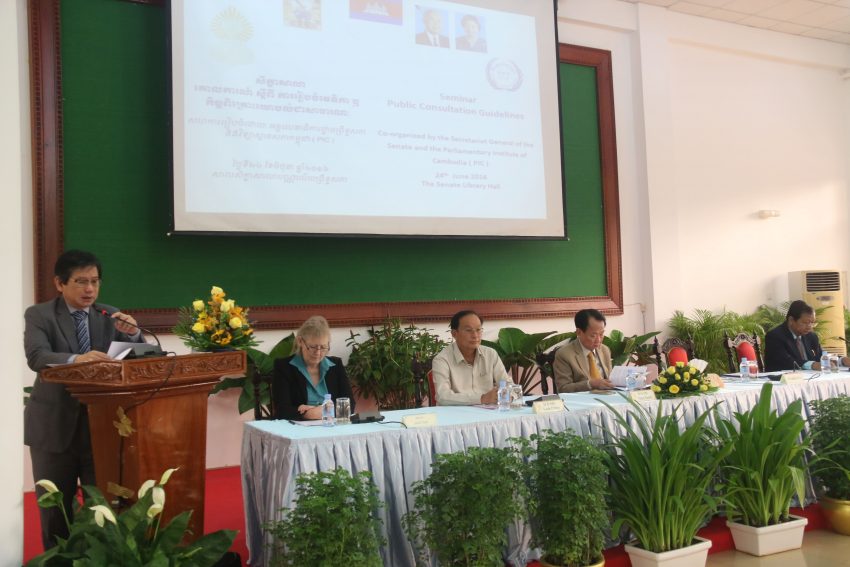A seminar on the newly drafted Public Consultation Guidelines took place on Friday 24 June 2016 at the Senate of Cambodia. This was organized by the General Secretariat of the Senate and the Parliamentary Institute of Cambodia, and staff from the General Secretariat constituted the 250 participants who attended the event. The purpose of the seminar was to introduce parliamentary staff to
the Public Consultation Guidelines, to alert them to its contents, and to tell them how this document could act as a useful resource to guide them in the preparation of forums or public consultations.
Mr Dararith Kim-Yeat, the Executive Director of the Parliamentary Institute of Cambodia, pointed out that the document could help to build the capacity of staff from the Senate’s General Secretariat in their important roles in preparing public consultations. He added that consultations are an important element in the democratic process, promoting the participation of the Cambodian people in parliamentary activity, and helping Members of Parliament to fulfill their roles of representation, legislation and oversight: it is important, he stressed, for Members of Parliament to communicate with citizens and to exchange information with their constituencies. Public consultations are an important way to achieve this.
In his opening remarks, H.E. Mr. Loak Chhay, the Deputy Secretary General of the Senate, stated that public consultations have been continuously organized with citizens in most regions, provinces, districts and communes. Every time a forum is organized, he said, new experiences are generated and ideas for improvement, as well as challenges, emerge. This provides an opportunity for lessons learnt to contribute to the preparation of ensuing forums. Until now, however, there had been an absence of a standard document to ensure consistency in the organization of forums from one to another: there had been a lack of documents to help parliamentary staff to understand the process. Thanks to cooperation between PIC and the General Secretariat, Public Consultation Guidelines had now been produced that would support staff in organizing forums in each region. The document would especially build a common understanding among Members of Parliament about how staff from the General Secretariat conduct the vital preparations for a public consultation.
Mr Khut Inserey, Director of PIC’s Outreach Department, gave an outline of the Public Consultation Guidelines. He stressed that public consultations are of great benefit to Members of Parliament – as such events enable them to engage directly with the people – and to the citizens who are given an opportunity to express concerns, or suggest solutions to the problems they face. Additionally, he highlighted the appendices within the Guidelines that provide step-by-step guidance for activities, and checklists, to support staff responsible for organizing these events.
The presentation was followed by discussion between the seminar participants and the group of panelists from PIC and the General Secretariat. In response to key questions from participants, there was agreement that there would be further support for capacity building to help parliamentary staff in the implementation of the Public Consultation Guidelines. The General Secretariat also agreed to provide the resources to support successful service delivery in terms of the running of public consultations in accordance with the Guidelines. Senior staff were urged to identify gaps in the relevant knowledge and skills so that these could be recognized as priorities for capacity building activity.
In his closing remarks, H.E. Mr Oum Sarith, Secretary General of Senate, expressed his support for the contents of the Public Consultation Guidelines and strongly urged all departments within the General Secretariat to familiarize their staff with the contents of this document. He also recommended that similar seminars should be arranged in September to introduce the Guidelines to Members of Parliament. This would promote a common understanding between administrators and politicians, he said, ensuring that communications and consultations with constituencies were as well-prepared as possible.

